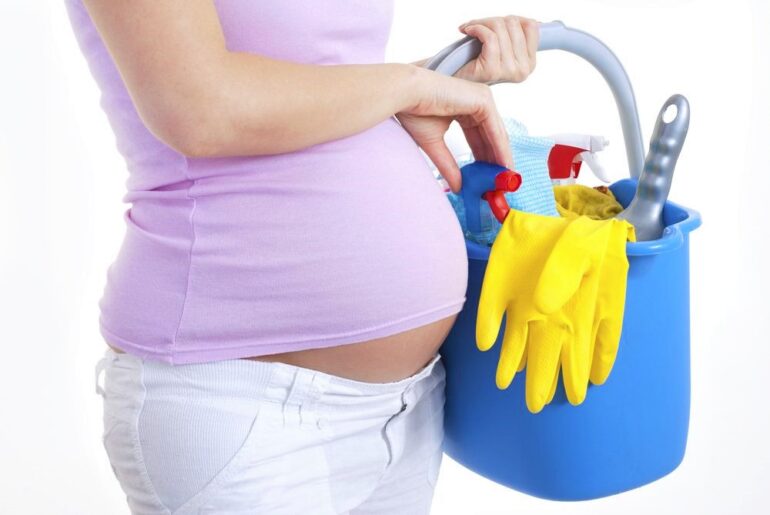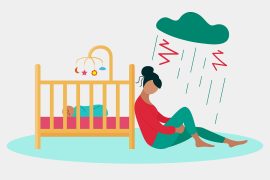Introduction:
Pregnancy is a time of excitement and anticipation. However, it’s also a period of heightened sensitivity. A clean environment is fundamental for the wellbeing of the mother and the unborn child, but not all household cleaning products are safe for expecting mothers. The sheer amounts of chemicals in some products might increase the risk of complications or birth defects.
General Safety Tips for Pregnant Women:
Pregnancy demands caution in every activity, even chores. Here are some universal precautions for expecting moms:
- Always wear gloves: This reduces direct skin contact with potentially toxic substances.
- Ensure good ventilation: Open windows and doors to allow fumes to escape, preventing inhalation.
- Read labels: Products labeled as toxic or harmful should be kept at bay.
- Brief cleaning sessions: Longer exposure can be harmful. Keep cleaning sessions short.
- Child-proof storage: Ensure all products are out of reach of children in the household.

Safe Ingredients and Products:
Your home can shine without the use of harmful chemicals. Safe cleaning solutions include:
- Baking Soda: A versatile cleaning agent that deodorizes and scrubs away dirt.
- White Distilled Vinegar: This natural disinfectant is ideal for various surfaces.
- Castile Soap: A plant-based soap, suitable for multiple cleaning tasks.
- Lemon Juice: Its antiseptic properties make it great for freshening up spaces.
- Olive or Vegetable Oil: Perfect for polishing wooden surfaces.
Products: Look for brands that the EWG (Environmental Working Group) endorses, emphasizing eco-friendly and non-toxic properties.
Ingredients and Products to Avoid:
Just as there are safe options, there are also harmful agents that pregnant women should avoid:
- Phthalates: Common in fragranced items, they can disrupt hormonal balance.
- Ammonia: A respiratory irritant that can exacerbate asthma and respiratory conditions.
- Formaldehyde: Some air fresheners and disinfectants contain this toxic compound.
- Glycol Ether: Found in specific oven cleaners and window sprays.
- Sodium Hydroxide: A caustic substance present in many oven and drain cleaners.
DIY Safe Cleaning Solutions:
Craft your cleaners using safe ingredients:
- All-Purpose Cleaner: Mix equal parts white vinegar and water. Add lemon juice for fragrance.
- Window Cleaner: Combine white distilled vinegar, water, and a drop of Castile soap.
- Bathroom Scrub: Baking soda with a bit of water forms a paste perfect for tiles and tubs.
Importance of Natural and Organic Products:
Healthier for Mother and Baby:
- Natural and organic products significantly reduce exposure to harmful chemicals, promoting better health for both the expecting mother and the unborn baby.
Environmentally Friendly:
- Organic farming practices reduce pollution, conserve water, reduce soil erosion, increase soil fertility, and use less energy.
- They also decrease the amounts of chemicals released into the environment, benefiting ecosystems and reducing harm to wildlife.
Reduced Chemical Exposure:
- Natural products often have fewer synthetic chemicals, reducing the risk of adverse reactions or health complications from chemical exposure.
Skin-Friendly:
- Natural and organic products tend to be gentler on the skin, reducing the chances of irritations or allergies.
Respiratory Health:
- Conventional cleaning agents can exacerbate or lead to respiratory conditions. Natural products often have milder scents and do not produce fumes that irritate the lungs.
Safer Products Over Time:
- Organic products don’t contain harmful preservatives, which means a reduced risk of health complications in the long run.
Holistic Approach:
- Natural products often embrace a holistic approach, considering the wellbeing of the user, the health of the environment, and the welfare of the source.
Supports Organic Farming:
- Purchasing organic products promotes organic farming practices, which are sustainable and promote a balanced ecosystem.
Economic Benefits:
- While the upfront cost might be higher for some organic products, the long-term health and environmental benefits can lead to fewer expenses in medical bills and environmental cleanup.
Transparent Sourcing:
- Many companies producing natural and organic products emphasize transparency, ensuring consumers know where ingredients come from and how they are processed.
Biodegradability:
- Natural products are often biodegradable, meaning they break down more easily without leaving lasting harm to the environment.
Promotes Mindful Consumption:
- Choosing organic and natural products encourages consumers to be more aware of what they bring into their homes, fostering a culture of mindful consumption.
Preservation of Ecosystems:
- Organic farming doesn’t use synthetic pesticides or herbicides, which can harm non-target plants and animals, preserving biodiversity.
In essence, choosing natural and organic products is not just a personal choice but a step towards creating a safer and more sustainable environment for future generations.
Additional Precautions:
Protection doesn’t end with choosing the right products:
- Consult experts: If unsure, healthcare professionals or midwives are there to help.
- Mask up: Especially when dust is involved.
- Avoid aerosols: Aerosol sprays can increase inhalation risks. Opt for squirt bottles instead.
- Safe storage: Once used, ensure cleaning products are stored safely.
Understanding Long-Term Effects:
Delayed Onset:
- Many chemicals can have latent effects that don’t present immediate symptoms but can manifest over time.
Childhood Asthma:
- Consistent exposure to specific chemicals in cleaning products during early life has been linked to the development of respiratory conditions like asthma in children.
Hormonal Disruptions:
- Chemicals like phthalates and parabens, often found in household products, can interfere with the endocrine system, affecting hormone levels and functions.
Reproductive Health:
- Some chemicals have been associated with fertility issues, birth defects, and other reproductive health complications when exposed over extended periods.
Neurological Concerns:
- Chronic exposure to certain chemicals can potentially affect the nervous system leading to issues like cognitive decline, behavioral changes, or developmental delays in children.
Cancer Risk:
- Prolonged exposure to certain carcinogenic chemicals can increase the risk of developing various forms of cancer.
Immune System Suppression:
- Over time, some chemicals can weaken the immune system, making individuals more susceptible to diseases and infections.
Bioaccumulation:
- Certain chemicals can accumulate in the body over time, increasing the risk of adverse health effects.
Environmental Impact:
- Many of these chemicals, once flushed or washed away, find their way into water systems, affecting aquatic life and potentially re-entering our food and water sources.
Allergic Sensitization:
- Repeated exposure to some substances might increase the risk of developing allergies or hypersensitivities to those or related compounds.
Skin Conditions:
- Long-term exposure to certain chemicals can lead to chronic skin conditions like eczema or contact dermatitis.
Alteration of Gut Microbiome:
- Some cleaning products, especially those with antimicrobial properties, can potentially disrupt the balance of the gut microbiome, leading to digestive issues.
Legacy Effects:
- Certain harmful chemicals can not only affect the person exposed but might have consequences for their offspring, a phenomenon known as transgenerational effects.
Conclusion:
Expecting mothers have a lot on their plates, but safety shouldn’t be a concern when maintaining a clean home. Prioritize health by choosing safe cleaning methods. Remember, reducing your exposure to harmful agents isn’t just about your health but also ensuring a healthy environment for your unborn child. With awareness and the right products, every corner of your home can be safe and sparkling.






